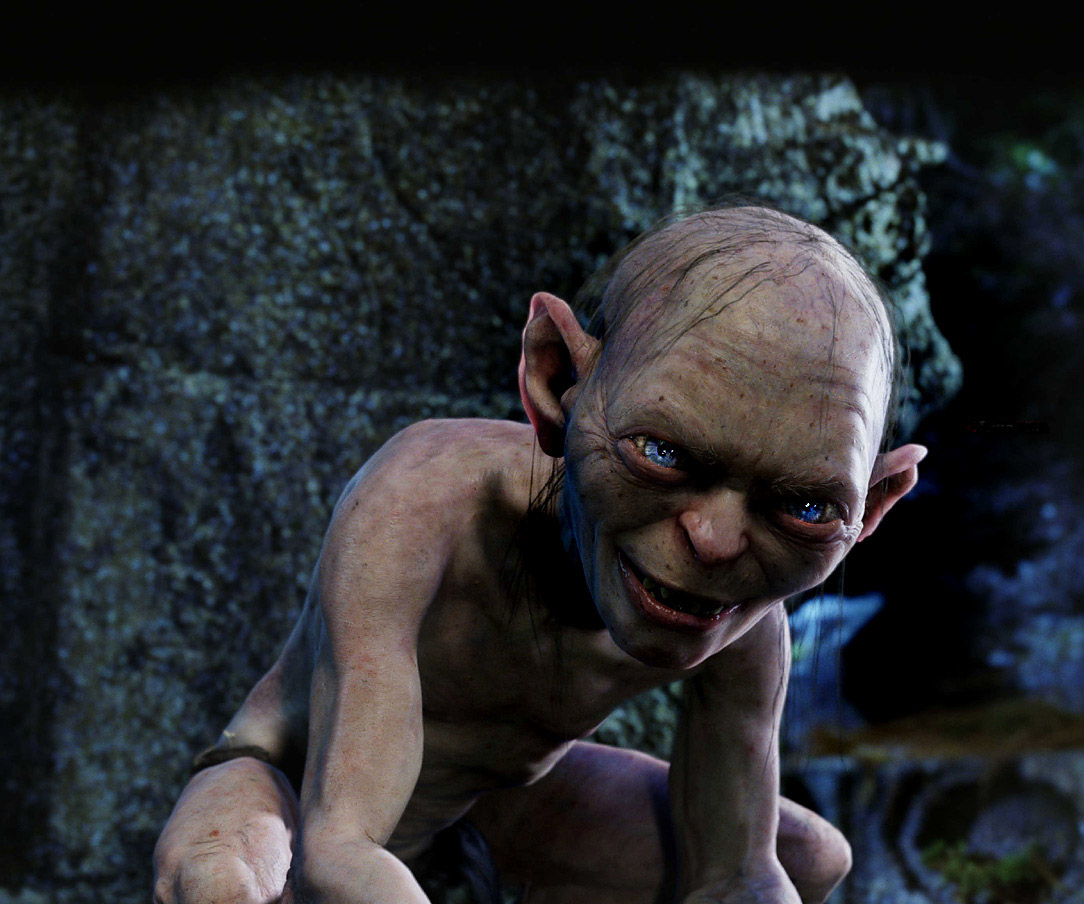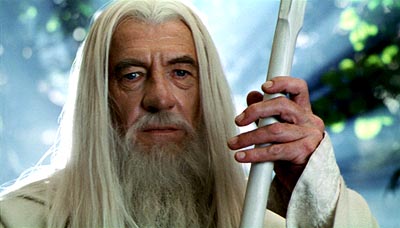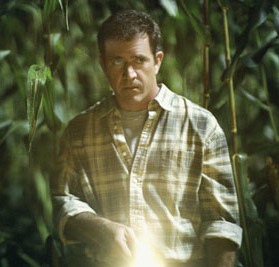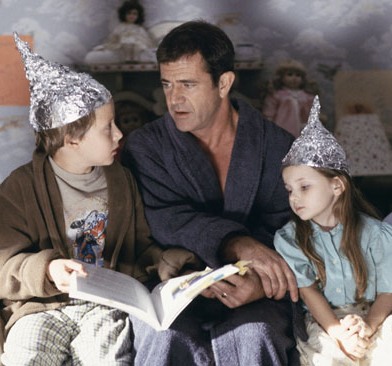So, seen TTT yet? After two showings yesterday, I must say I’m delighted and (still) surprised at how wondrous this second chapter turned out. [As with FOTR, I spent the first showing half-reeling from information overload and half-running aggravating fanboy self-diagnostics the whole time. (“Wow! I like it! Do I like it? Do I really like it? I want to really like it. I think I like it. Wow! Hey, that wasn’t in the book! Was it? I’m not sure. Do I like it?“) The second time I could just sit back and enjoy it for the glorious epic it is. Be warned – although TTT is seamlessly integrated with the first movie, it’s not Fellowship. But then again, it really shouldn’t be. Anyway, there is much I love about this second installment, particularly… [The post from now on will feature TTT SPOILERS.]
 1) Gollum (“Leave and never come back!“): My biggest concern entering the back-end of the trilogy was that Smeagol would come off cartoony and Jar Jar-ish. He doesn’t…at all. (As one wag put it, the Jar Jar in this film is Gimli.) In fact, I’d say Smeagol’s moonlit and schizophrenic soliloquy stands as the showstopping highlight of a film filled with amazing moments and indelible images. Kudos to Andy Serkis and the WETA gang for what they’ve done here. By the end, I wanted to see more Gollum and less preparation for Helm’s Deep (But to be fair that’s the same problem I have with Tolkien’s book – The events east of the Anduin seem so much more interesting and important due to the presence of the ring.) And, speaking of the eastern theater…
1) Gollum (“Leave and never come back!“): My biggest concern entering the back-end of the trilogy was that Smeagol would come off cartoony and Jar Jar-ish. He doesn’t…at all. (As one wag put it, the Jar Jar in this film is Gimli.) In fact, I’d say Smeagol’s moonlit and schizophrenic soliloquy stands as the showstopping highlight of a film filled with amazing moments and indelible images. Kudos to Andy Serkis and the WETA gang for what they’ve done here. By the end, I wanted to see more Gollum and less preparation for Helm’s Deep (But to be fair that’s the same problem I have with Tolkien’s book – The events east of the Anduin seem so much more interesting and important due to the presence of the ring.) And, speaking of the eastern theater…
2. Faramir: (“Time for Faramir Captain of Gondor to show his quality.“) The dramatic alteration to Boromir’s bro seems to be the change most bothering the Tolkien fan nation. To be honest, I preferred Faramir this way. In the books, he alway came off to me as an Aragorn clone…in this version, I think he shows more depth, and it keeps the ring interesting. The detour to Osgiliath was jarring at first, but it makes sense…not only in giving Frodo and Sam more to do but also explaining why Sauron might concentrate so heavily on Gondor in ROTK (Y’all know what I mean.) As for Faramir’s change of heart at the end of the film, it seemed a bit too quick to me the first time around, but the second time it made more sense. By then, Faramir has already discovered the ring has (a) possibly killed his brother and (b) driven this creature with “an ill-favored look” thoroughly batty. When he witnesses trance-Frodo trying to give the Ring of Power to a Nazgul rather than trying to wield its vaunted power, I could see how he’d put it all together.
3. Rohan: (“Forth Eorlingas!“) Theoden, Grima, and Eowyn all do very well here, as does the magnificent set design of Edoras. I could look at Grima most of the time and not think Brad Dourif, which is no small achievement (the accent helped.) And Theoden seemed legitimately staggered by the forces arrayed against his kingdom. (“Such reckless hate…how did it come to this?“) I wish they’d kept the scene of Eowyn dispatching some wayward Uruk-Hai in the Glittering Caves, but perhaps it’ll make the extended cut.
 4. Gandalf the White: (“I did not brave fire and death to bandy craven words with a witless worm.”) The transition (and dislocation) from grey to white was handled quite well, I thought, and Ian McKellen was superb once again. I’m even more annoyed now with the Academy for passing him over last year in favor of the admittedly good Jim Broadbent (who won for Iris but no doubt got most of his votes for Moulin Rouge), since the Gandalf scenes are too slim here to warrant nomination.
4. Gandalf the White: (“I did not brave fire and death to bandy craven words with a witless worm.”) The transition (and dislocation) from grey to white was handled quite well, I thought, and Ian McKellen was superb once again. I’m even more annoyed now with the Academy for passing him over last year in favor of the admittedly good Jim Broadbent (who won for Iris but no doubt got most of his votes for Moulin Rouge), since the Gandalf scenes are too slim here to warrant nomination.
5. Treebeard and the Ents: (“That does not make sense to me. But, you are very small.“) Looked a bit fake, sure. And they fell out of the picture for a good two hours in the middle there. But, the payoff at the end was huge and, as I said before, I’ve never been enough of an Ent fan to feel slighted anyway. And, speaking of ents…
6. Magnificent moments: (“Stupid fat hobbit!“) How ’bout the Ent on fire taking advantage of the flooding Isen? There are so many stand-out scenes in the film that I could never list them all here. I love the wide-angle shot of a flaming ball(rog) descending into the underground sea. The dialogue between the orcs and Uruk-Hai was great fun. (“How ’bout their legs? They don’t need their legs.“) The exorcism of Theoden was a novel take on the healing, and the subsequent mourning of Theodred was well-handled. Arwen at the grave of Elessar was very touching. Much of the battle of Helm’s Deep was not only surprisingly easy to follow but also pure eye candy, from the Olympic-torch-wielding Uruk Hai to Legolas’ dispatching of the mega-siege ladder. Don’t forget the wonderful shot of Frodo confronting the fell beast on the Osgiliath roofs. And, then of course, there’s pretty much everything involving Gollum. Of course, though, they’d take away my fanboy cred if I didn’t have a few…
7. Quibbles: (“So few…Lord Aragorn, where is he?“) I really could have done without the whole Aragorn-falling-off-the-cliff bit, and Brego the Wonder Horse doesn’t help matters. There’s already too many “dead-not dead!” moments in the trilogy (and too many deus ex machinas, while I’m at it), and PJ really shouldn’t have tested the audience’s patience by throwing in one more. Also, while I like seeing what the elves were up to, the Galadriel speech came across like a recap for the plot-impaired. We’ve been watching the movie for two hours now, so if we haven’t figured it out by now…Same goes for the Middle-Earth map brought out right thereafter – It would have been much more useful earlier, I’d think. Other questions…Why is so much footage from the early previews missing? (“Sauron is not yet so mighty that he does not know fear…“) How does Grima just miss the fact that 10,000 Uruk Hai have lined up outside Orthanc? Why isn’t the back of Haldir’s head split open during his death scene? And when the Ents attack, why does Saruman seem like he just lost a contact?
And so on and so on. But I’m nitpicking what I thought was overall a deliciously good second installment in the Tolkien trilogy. And, with the ends of both the Isengard and Cirith Ungol storylines to be packed in with all the multitudinous events of ROTK, I see no way the next one can clock in under 210 minutes. Should be grand!

 1) Gollum (“Leave and never come back!“): My biggest concern entering the back-end of the trilogy was that Smeagol would come off cartoony and Jar Jar-ish. He doesn’t…at all. (As one wag put it, the Jar Jar in this film is Gimli.) In fact, I’d say Smeagol’s moonlit and schizophrenic soliloquy stands as the showstopping highlight of a film filled with amazing moments and indelible images. Kudos to Andy Serkis and the WETA gang for what they’ve done here. By the end, I wanted to see more Gollum and less preparation for Helm’s Deep (But to be fair that’s the same problem I have with Tolkien’s book – The events east of the Anduin seem so much more interesting and important due to the presence of the ring.) And, speaking of the eastern theater…
1) Gollum (“Leave and never come back!“): My biggest concern entering the back-end of the trilogy was that Smeagol would come off cartoony and Jar Jar-ish. He doesn’t…at all. (As one wag put it, the Jar Jar in this film is Gimli.) In fact, I’d say Smeagol’s moonlit and schizophrenic soliloquy stands as the showstopping highlight of a film filled with amazing moments and indelible images. Kudos to Andy Serkis and the WETA gang for what they’ve done here. By the end, I wanted to see more Gollum and less preparation for Helm’s Deep (But to be fair that’s the same problem I have with Tolkien’s book – The events east of the Anduin seem so much more interesting and important due to the presence of the ring.) And, speaking of the eastern theater… 4. Gandalf the White: (“I did not brave fire and death to bandy craven words with a witless worm.”) The transition (and dislocation) from grey to white was handled quite well, I thought, and Ian McKellen was superb once again. I’m even more annoyed now with the Academy for passing him over last year in favor of the admittedly good Jim Broadbent (who won for Iris but no doubt got most of his votes for Moulin Rouge), since the Gandalf scenes are too slim here to warrant nomination.
4. Gandalf the White: (“I did not brave fire and death to bandy craven words with a witless worm.”) The transition (and dislocation) from grey to white was handled quite well, I thought, and Ian McKellen was superb once again. I’m even more annoyed now with the Academy for passing him over last year in favor of the admittedly good Jim Broadbent (who won for Iris but no doubt got most of his votes for Moulin Rouge), since the Gandalf scenes are too slim here to warrant nomination. a) Let’s begin with the ending….if you’ve seen it, you know what I’m going to say, but c’mon…the water bit made absolutely no sense. Even aside from the fact that both this planet and its inhabitants are made up of mostly water, what were these aliens going to do if it rained? b) Why travel interstellar distances in state-of-the-art ships, cloak after everyone’s seen you, and then run around the planet comprised of 75% water stark-naked? c) Why was the alien fx so horribly bad? It gave me shivers about Gollum. d) Every one of the small-town folk came off as completely Hollywood-false, particularly the good-hearted sheriff and Basil Exposition, the “probing” army recruiting officer. e) Mel’s a preacher, Joaquin’s a down-and-out minor leaguer…who’s actually harvesting all that corn? f) The ridiculous foreshadowing of Mel’s crisis of faith – “Don’t call me father” over and over again. Which brings me to another problem with the ending: So all of these signs somehow do add up to cosmic design, such as the kid having asthma and the dead wife being savvy enough to tell Mel it might be a good idea to have Slugger go after the alien with a baseball bat…what does this mean about God? He’s a God of Humanity only, unconcerned with the fate of this poor water-hating, lousy-FX alien? I don’t buy it.
a) Let’s begin with the ending….if you’ve seen it, you know what I’m going to say, but c’mon…the water bit made absolutely no sense. Even aside from the fact that both this planet and its inhabitants are made up of mostly water, what were these aliens going to do if it rained? b) Why travel interstellar distances in state-of-the-art ships, cloak after everyone’s seen you, and then run around the planet comprised of 75% water stark-naked? c) Why was the alien fx so horribly bad? It gave me shivers about Gollum. d) Every one of the small-town folk came off as completely Hollywood-false, particularly the good-hearted sheriff and Basil Exposition, the “probing” army recruiting officer. e) Mel’s a preacher, Joaquin’s a down-and-out minor leaguer…who’s actually harvesting all that corn? f) The ridiculous foreshadowing of Mel’s crisis of faith – “Don’t call me father” over and over again. Which brings me to another problem with the ending: So all of these signs somehow do add up to cosmic design, such as the kid having asthma and the dead wife being savvy enough to tell Mel it might be a good idea to have Slugger go after the alien with a baseball bat…what does this mean about God? He’s a God of Humanity only, unconcerned with the fate of this poor water-hating, lousy-FX alien? I don’t buy it. g) The kids…ugh, the ever-lovin’ kids. Too wise, too special, too obnoxious. h) The family scenes, and particularly the strange last dinner episode and both of the ill-timed disquisitions on childbirth…flat, bizarre, and wholly unrealistic. i) The television. You’d think after 9-11 it’d be much easier to create realistic looking “crisis television.” But every time they turned on the idiot box it was stilted, exposition time again, the Brazilian birthday party scene aside, one of the only legitimately scary and well-done sequences in the film. j) With the exception of the shiny knife under the pantry door (don’t get me started on why these aliens have so many issues with doors – this away team didn’t bring a phaser or an axe to their alien invasion?), almost all of the “Hitchcockian flourishes” seemed too consciously crafted, particularly both long scenes involving the flashlight. I think I liked it better when it was called “The Blair Witch Project.” Ok, enough dissing the film. Suffice to say, I don’t recommend it. Joaquin was very good, and to be honest Mel wasn’t bad either. I blame Shyamalan. (In happier news, I saw
g) The kids…ugh, the ever-lovin’ kids. Too wise, too special, too obnoxious. h) The family scenes, and particularly the strange last dinner episode and both of the ill-timed disquisitions on childbirth…flat, bizarre, and wholly unrealistic. i) The television. You’d think after 9-11 it’d be much easier to create realistic looking “crisis television.” But every time they turned on the idiot box it was stilted, exposition time again, the Brazilian birthday party scene aside, one of the only legitimately scary and well-done sequences in the film. j) With the exception of the shiny knife under the pantry door (don’t get me started on why these aliens have so many issues with doors – this away team didn’t bring a phaser or an axe to their alien invasion?), almost all of the “Hitchcockian flourishes” seemed too consciously crafted, particularly both long scenes involving the flashlight. I think I liked it better when it was called “The Blair Witch Project.” Ok, enough dissing the film. Suffice to say, I don’t recommend it. Joaquin was very good, and to be honest Mel wasn’t bad either. I blame Shyamalan. (In happier news, I saw